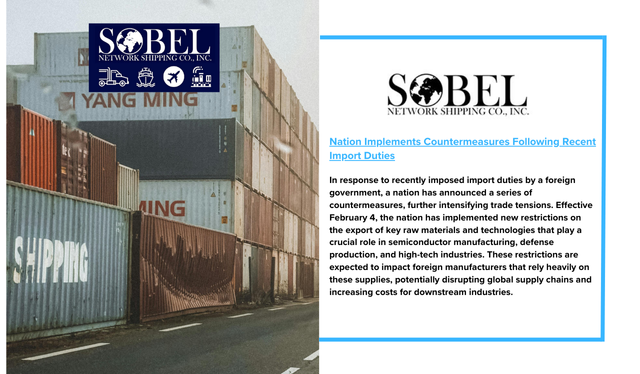In response to recently imposed import duties by a foreign government, a nation has announced a series of countermeasures, further intensifying trade tensions. Effective February 4, the nation has implemented new restrictions on the export of key raw materials and technologies that play a crucial role in semiconductor manufacturing, defense production, and high-tech industries. These restrictions are expected to impact foreign manufacturers that rely heavily on these supplies, potentially disrupting global supply chains and increasing costs for downstream industries.
Alongside these export controls, the nation has also expanded its list of restricted foreign entities, adding two companies operating in the apparel and biotechnology sectors. This move marks a significant escalation, as it is the first time non-defense-related businesses have been subjected to such trade limitations. The affected companies will now face strict prohibitions on conducting import and export transactions within the nation, establishing new investments, and engaging in local business operations. Furthermore, senior executives associated with these entities will be restricted from entering the country, with existing visas being revoked and future applications denied.
These measures are seen as a direct response to the recent tariff increases implemented by another major economy, which cited national security and economic fairness as key justifications for the new trade barriers. The latest retaliatory steps suggest that both sides are prepared to sustain a prolonged economic standoff, raising concerns over potential supply shortages, price increases, and broader geopolitical implications.
Trade analysts warn that this escalation could have widespread consequences, affecting industries ranging from consumer electronics to automotive production. Many businesses are now reassessing their supply chain dependencies and exploring alternative sourcing options to mitigate potential disruptions. However, given the complexity of global trade networks, adjusting to these restrictions will take time and could lead to increased volatility in certain markets.
This ongoing trade dispute underscores the growing economic and technological competition between major economies, with each side leveraging policy tools to protect its strategic industries. Observers will be closely monitoring the situation to assess the long-term impact on global commerce and whether diplomatic negotiations may eventually ease tensions. In the meantime, businesses operating in affected sectors will need to navigate an increasingly complex trade environment as they adapt to evolving regulatory and geopolitical challenges.


